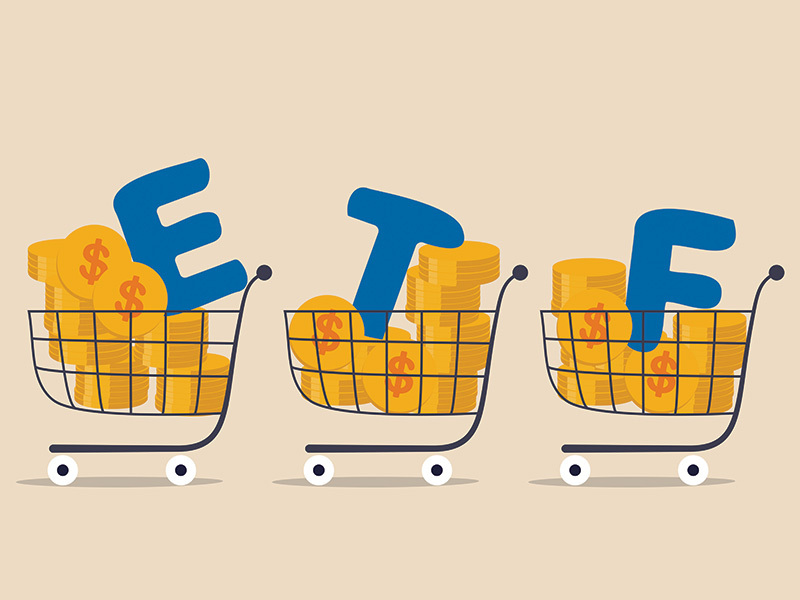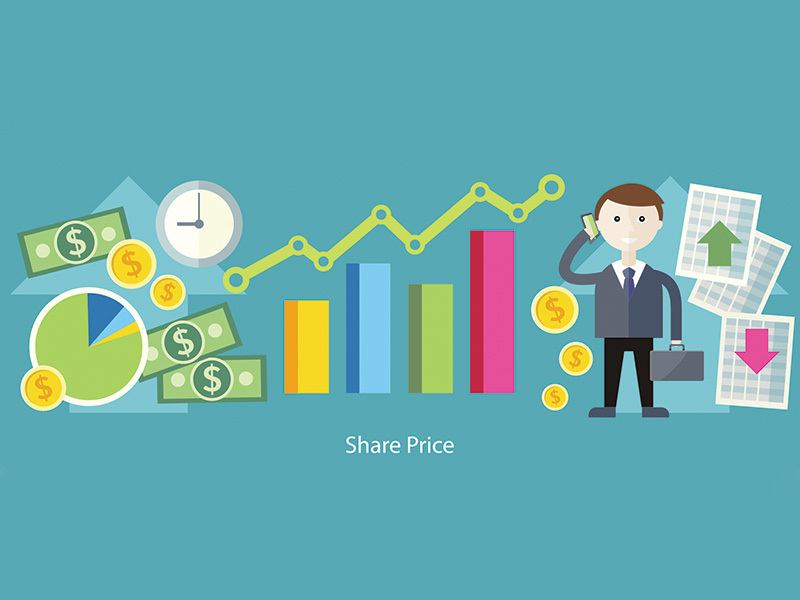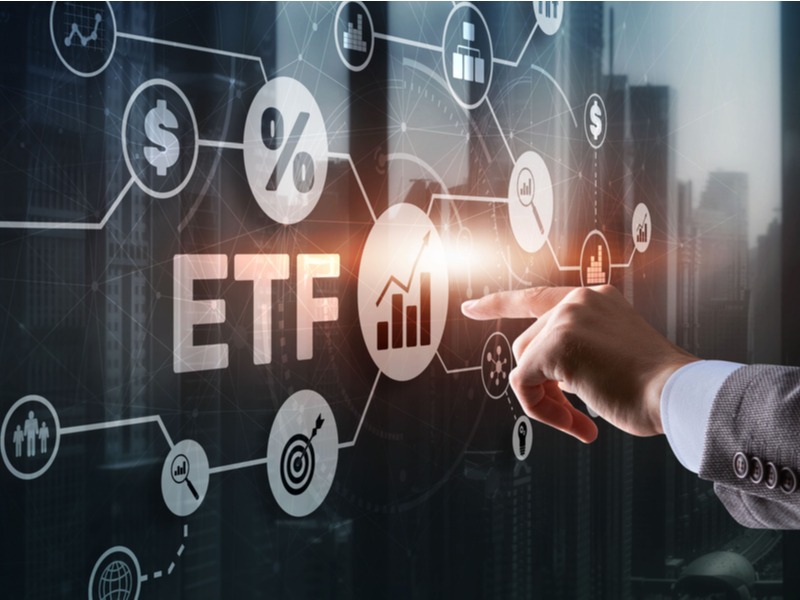
[wpseo_breadcrumb]
Exchange Traded Funds(ETF)- What are they and how do they work?
Exchange Traded Funds, more popularly known as ETFs, are a type of investment funds. These funds have the characteristics of shares and mutual funds. These funds are not individual investments like stocks but a bunch of securities compiled together to form a fund but can be traded in the open market like shares or stocks. This is where they differ from mutual funds as mutual funds cannot be traded throughout the day on a real-time basis but after the completion of trading hours based on their value at the end of the day.
ETFs can be bought or sold in units, thus limiting the exposure of the investor at the same time, allowing them to take the benefit of intraday trading.
Given below are some details related to the ETFs.
How to invest in ETFs?
As mentioned above, ETFs are an easier and better option for potential investors who wish to dabble in the stock market yet want to limit their exposure. ETFs are a pool or collection of diverse assets or securities that are used to form a single fund. Like index funds, ETFs also track the underlying index and enable the investor to trade on a real-time basis.
ETFs usually have the same portfolio, i.e. securities in similar weights as the index it tracks and tries to replicate the performance of the underlying index like Sensex or NIFTY 50. Hence, ETF value moves up or down based on the values of underlying securities.
ETFs are traded like any normal share or security on the exchange. The value of the ETF is based on the price fluctuations of a single or multiple securities that are part of the fund.
These funds can be either actively managed funds or passively managed funds. However, in Indian markets, ETFs are passively managed funds. Actively managed funds are managed by dedicated portfolio managers or fund managers who track the markets closely to reduce the tracking errors and maximize the performance of the ETF. Passively managed ETFs simply follow the underlying index and do not require a team of dedicated fund managers to maximize the returns.
Potential investors can invest in the ETFs through registered brokers like any other shares or securities. Alternatively, investors can invest in the ETFs on their own by opening a Demat account and managing it on their own by trading in the selected ETF. This will eliminate the charges that would otherwise have to be paid to the brokers but will require the investor to be informed about ETFs and its working.
Advantages of ETF
-
Reduced expense ratio
Trading in ETFs is a less expensive affair as compared to trading in mutual funds or even index funds. Most ETFs are passively managed funds, and hence the expense ratio is quite low. Also unlike mutual funds, ETFs do not have any additional charges like entry or exit load. This significantly reduces the expenses to invest in an ETF ultimately benefiting the investors.
-
Reduced risk
ETFs have a diversified portfolio of securities that are combined to form a single fund. The performance of the fund is reflected by the performance of the individual assets of the fund. Hence, if one asset underperforms, and the other performs better, the net result for the fund will be offset and it reduces the overall risk. Also, as ETFs are usually passively managed funds, the risk involved in investing in ETFs is quite lower than compared to investing directly in stocks, mutual funds, etc. and the tracking errors are also significantly less.
-
Access to different markets
Trading in ETFs provides an opportunity for the investors to invest in different markets that were earlier not accessible to retail investors. Investors can trade in different markets like forex, gold, commodity market, debt or equity market, emerging markets, etc. The investors can decide the underlying market they want to trade in and trade in relevant ETFs.
-
Tax benefit
ETFs are taxed based on the underlying securities and the investors can get indexation benefits on Long term capital gains just like debt funds/securities.
-
Better transparency and liquidity
ETFs can be traded like shares throughout the day on a real-time basis. This ensures the high liquidity of the fund. Most ETFs provide complete transparency of their underlying assets and their daily portfolio as compared to other funds like hedge funds or mutual funds that provide reports on their holdings quarterly. This provides better investor awareness to make timely decisions as compared to other investment options like mutual funds
Things to keep in mind while investing in ETFs
-
The volatility of the markets
The performance of ETFs is dependent on the performance of the underlying assets or the index that it tracks. The value of these funds like shares is also subject to price fluctuations and the risk of volatile markets.
-
Diversified investment
ETFs being a cluster of securities provide diversity in the fund. However, they do not provide higher gains with multiple assets performing in opposite directions. For Example, if one asset or security in the fund is positively performing but another asset or security of the fund with a relatively higher weight is underperforming or negatively performing, the overall result of the ETF will not be high.
-
Cost of brokerage and the need for a demat account
The cost involved in trading ETFs is the commission fees charged by the fund managers, which is part of the expense ratio. These charges are nominal, as they are passively managed funds and have to be borne by the investor. When the investor invests in the ETFs on their own, it requires them to open a Demat account and trading account and pay brokerage for such services to the brokers. However, investors will require to have a thorough understanding and analysis of the markets in such cases.
-
Less exposure for small and medium companies
ETFs normally invest in companies having higher market value and those companies that consistently give better performance and higher results. This often leads to small or medium companies with high potential being ignored.
How to select the right ETF to invest in?
Selecting the right ETF in accordance with your risk appetite and investment goals is very important to reap benefits.
-
Identify the index for investment
The foremost step to invest in an ETF is selecting the index for investment. This requires an in-depth analysis by the investor or the help of brokers having expert knowledge of the same. For example, if an investor has in-depth analyzed a particular asset or industry performance, he/she can invest in such asset or industry or can invest in the index to minimize exposure.
-
Look for funds with reduced tracking errors
ETFs track the underlying index for their performance and try to match it closely. However, there may be certain deviations which are known as tracking errors. This is part of an investment in ETFs. Investors have to select funds that have low tracking warriors and higher efficiency or performance.
-
Choose funds with higher liquidity
Investors have to select ETFs that have higher liquidity and trade volume, which ensures higher profitability or return on investment. While tracking liquidity, the investor has to ensure the liquidity of the shares being tracked and the fund. Monitoring liquidity assures the investor to exit the fund whenever they want, especially at the time of market declines. An efficient ETF has market markers that track the buying and selling to ensure sufficient liquidity of the fund at all times.
-
Go in for a lower expense ratio
Apart from reduced tracking errors, the funds having a low expense ratio is another important factor while selecting an ETF. A fund with a lower expense ratio along with reduced tracking errors will ensure a higher return on investment to the investors.
Difference Between ETF and Mutual Funds
ETFs are like mutual funds, but there are many differences between the two types of funds.
| ETFs | Mutual Funds | |
| Availability of Real-Time Trading during market hours | ETFs can be traded during market hours | Mutual Funds cannot be traded. You buy or sell the fund unit at NAV declared at the end of the day to the AMC. |
| The benefit of Limit Orders | Investors can trade ETFs based on a limit order facility where a transaction is executed when the price level selected by the investor is reached | Mutual Funds do not have the benefit of limit orders and hence cannot be traded on a preselected price |
| Availability of Intraday trading | Investors can track the direction of markets and trade accordingly during the day | The intraday trading facility is not possible with mutual funds. |
| Returns being at par with the market or index | Since ETFs match the underlying fund, returns are more or less at par with the market or index | Mutual Funds are carefully created funds based on thorough analysis and not necessarily in the same composition as the index, hence returns may not always match the market |
| Exit Load | Investors can exit from the ETF at any point hence, there is no exit load in the case of ETFs | Exit loads are fees charged by the Mutual Funds when an investor exits from the fund partially or fully within a specified period from the date of the initial investment. |
Popular ETFs in India
There are many ETFs available in the market for investors to choose from. These are some of the popular ETFs.
| Index ETFs | Gold ETFs | Sector ETFs | Bond ETFs |
| HDFC Sensex ETF | HDFC Gold Exchange Traded Fund | Kotak NV 20 ETF | LIC G-Sec LTE Fund |
| UTI Sensex Exchange Traded Fund | SBI ETF Gold | Nippon ETF Infra BeES | SBI ETF 10Y Gilt |
| Motilal Oswal NASDAQ 100 ETF | Invesco India Gold ETF | ICICI Prudential NV20 ETF | Nippon ETF Long Term Gilt |
Investing in ETFs has gained immense popularity in recent years and has increased in volume. This is majorly on account of increased investor awareness among many other factors. ETFs are among the safest investment options for Indian markets where most investors are risk-averse and hence, can gain higher returns on a lower expense ratio.
Frequently Asked Questions
Are ETFs traded in the open market?
Yes. ETFs like individual stocks or shares can be traded actively in the open market during market hours.
What are the types of ETFs?
The types of ETFs available in the market are listed below,
Index ETFs
Currency ETFs
Gold ETFs
Bond ETFs
Sector ETFs
Leveraged ETFs
Is ETF a favorable investment option for beginners?
Yes. investment in ETF is quite favorable for a beginner as it has many benefits like a lower expense ratio, higher liquidity, reduced risk, low investment to start investments, etc.
Does an ETF pay a dividend?
Yes. If the ETF holds a stock that bears a dividend, the same is provided by the ETF as well.
Can an ETF value become nil?
ETF is a portfolio of multiple securities. Hence, the only way the value of an ETF will become nil is if the value of each of the underlying security becomes zero.



























